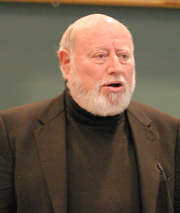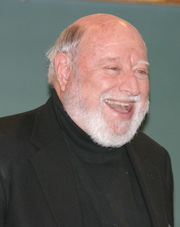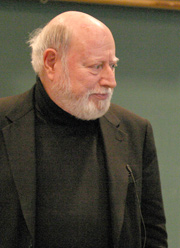 In higher education, Lee Shulman is the man many believe has "been there and done that." The president of the Carnegie Foundation for the Advancement of Teaching boasts a resume studded with accomplishments in curriculum design and review; assessment; and the promotion of pedagogical practices that make him a guru in all things education.
In higher education, Lee Shulman is the man many believe has "been there and done that." The president of the Carnegie Foundation for the Advancement of Teaching boasts a resume studded with accomplishments in curriculum design and review; assessment; and the promotion of pedagogical practices that make him a guru in all things education.
He spent two days on campus as a guest of the Academic Program Review committee, which has spent almost a year looking at the Wabash curriculum with plans for a full-scale review and has brought in four national experts. In a talk he called "Some Thoughts About the Wabash Curriculum," Shulman threw out some wild ideas in a six-part series of recommendations.
Broadly excerpted, here's a sample of what Shulman presented to the 40 or so faculty and administrators gathered for his final presentation Tuesday.
1) The Notion of Teaching
"What does the teaching and learning experience look like, feel like [when teaching is at the forefront], and how that can become the essence of a liberal arts education? What happens when content is secondary."
He spoke at length of the possibilities of every Wabash student engaging in the concept of being a teacher in the process of learning, suggesting that Wabash develop a habit of engaging every student in discourse from a teaching perspective.
 "What would it look like if your Admissions materials said, 'Don't come to Wabash College unless you are prepared to undertake the concept of teaching.' Doing so would clearly make your first principle teaching and learning."
"What would it look like if your Admissions materials said, 'Don't come to Wabash College unless you are prepared to undertake the concept of teaching.' Doing so would clearly make your first principle teaching and learning."
2) The Structure of the Curriculum
"The dominant form of curricular structure in all of education takes a student from the general to the particular," he said. "Why? And might it be otherwise? The general is much more difficult to do than the particular."
He gave an example of how the University of Dayton requires all students on tracks to become teachers to take a parallel "studio" course that requires them to imagine how every course they study would be taught. "How would you teach something that you've come to understand" is the concept.
Knowing how liberal arts colleges loathe pre-professional teaching, Shulman offered a radical suggestion: "What if we tried to invent a curriculum that didn't avoid the professional, but began with it?" Addressing professional issues from a liberal arts perspective, he suggested, would force students to "unpack" the issue using ethical, legal, historical, and economic knowledge. "I'm suggesting a problem-based liberal arts education that begins with problems and challenges of living and unpacks them using the liberal arts. Certainly students would stop asking, 'Why do I have to know this?'"
3) What's on the Test?
Shulman acknowledged that students only want to know "what's going to be on the test" so they know what to study. His proposal was to turn things inside out and state evaluation methods up front:
 "How we assess and evaluate students is the most direct reflection on the mission of the institution," Shulman said. "What would an assessment system look like that would articulate clearly to students what we at Wabash value? How much thought is being put into evaluation and what it means? What happens when evaluation becomes a public act?"
"How we assess and evaluate students is the most direct reflection on the mission of the institution," Shulman said. "What would an assessment system look like that would articulate clearly to students what we at Wabash value? How much thought is being put into evaluation and what it means? What happens when evaluation becomes a public act?"
4) The "Threatened Species"
In an age of distance learning, massive multi-function universities, adult education, continuing education, commuter campuses, etc., Shulman recognizes that places like Wabash are a "threatened species." He knows this firsthand because of the Carnegie Foundation's forthcoming reclassification of colleges and universities.
"The four-year baccalaureate, liberal arts institution with a low transfer-in rate, that is residential, is a threatened species. To what extent is the way in which Wabash College teaches taking advantage of this incredible 24/7 learning environment?"
He suggested that faith-based institutions take advantage of chapel hours to extend the classroom. He wondered if football games at Wabash were akin to that notion.
"What if classroom time was secondary to out-of-classroom learning? What happens if you take 'community' seriously and put it into the mix?"
5) The Role of Students
Shulman wondered out loud if the Academic Program Review Committee had solicited response from students during their inquiry. "You have smart students at Wabash, whose loyalty is second only to alumni."
He suggested the the committee think about forming research teams of students, who would take a close look at the entire curriculum.
"Think of this campus as a laboratory, a lab for human learning," he said. "We're always looking for undergraduate research projects for students outside the sciences. Why not have students do research on your curriculum just to see what they might do with it?"
6) Looking Closely at Wabash
"Every school as an obligation to study itself as much as the world around it," Shulman said, after discussing the way in which the University of Chicago uses itself in its research. "You are in a very unusual position at Wabash; you have a Center of Inquiry in the Liberal Arts here and it's a place that much of the nation sees as providing tools and resources for the study of liberal education. It's time you become selfish about that. If you've got the courage as a faculty, Wabash should be the most exciting laboratory for liberal learning in the country.
"Go at this with an experimental attitude and engage with students as experimental collaborators."